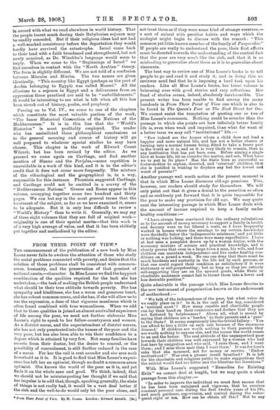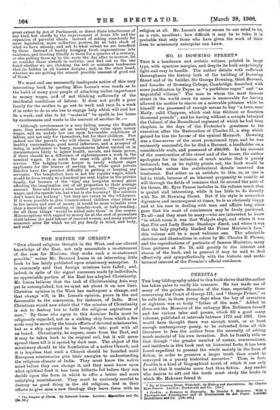FROM THEIR POINT OF VIEW.*
THE announcement of the publication of a new book by Miss Loane never fails to awaken the attention of those who study the social problems connected with poverty, and desire that the solution of those problems shall be consistent with common- sense, humanity, and the preservation of that greatest of national assets,—character. In Miss Loane we find the happiest combination of the qualities required for the task she has undertaken,—the task of making the British people understand what should be their true attitude towards poverty. She has sympathy and kindliness, she has a warm and generous heart, she has robust common-sense, and she has, if she will allow us to use the expression, a dose of that vigorous manliness which is often found combined with true womanliness. When we add that to these qualities is joined an almost unrivalled experience of life among the poor, we need not further elaborate Miss Loane's right to speak to her fellow-countrymen and women. As a district nurse, and the superintendent of district nurses, she has not only penetrated into the homes of the poor and the very poor, but has also been able to win their confidence to a degree which is attained by very few. Not many families have secrets from their doctor, but the desire to conceal, or the possibility of concealment, is still further reduced in the case of a nurse. For her the veil is rent asunder and she sees each household as it is. It is good to find that Miss Loane's experi- ence has left her an optimist, though no doubt a common-sense optimist. She knows the world of the poor as it is, and yet finds it on the whole sane and good. We think, indeed, that we should not be misinterpreting her thought if we said that her impulse is to add that, though, speakinggenerally, the state of things is not really bad, it would be a vast deal better if the rich and the well-to-do would only let the poor alone, and • Prow. Their Point of View. By M. Loane. London: Edward Arnold. [438.]
not treat them as if they were some kind of strange creature,—,a sort of animal with peculiar habits and ways which the
zoologist might begin to discuss with the remark : "This common yet little-known member of the family of Pauper idae."
If people are really to understand the poor, their first efforts must be directed towards the understanding of the central fact that the poor are very much like the rich, and that it is as misleading to generalise about them as it is to generalise about viscounts.
The best way to review one of Miss Loane's books is to tell people to go and read it and study it, and in doing this no reviewer need feel that he is imposing a bard task upon his readers. Like all Miss Loane's books, her latest volume is brimming over with good stories and racy reflections. Her fund of stories seems, indeed, absolutely inexhaustible. The present writer has been unable to find among the many hundreds in From, Their Point of View one which is also to be found in The Queen's Poor or The Next Street but Otte. We cannot resist the temptation of quoting one or two of Miss Loane's comments. Nothing could be sounder than the passage in which she points out how infinitely better family life is, even when weak and impaired, than what for want of a better term we may call "institutional" life :— " Few indeed are the homes where a child does not lead a happier and more natural life, and has not a better chance of turning into a normal human being, fitted to take a brave part in the world as it is, and as it is very likely to remain, than in any institution that has yet been seen. Before aiming a single blow at home life, let us consider the matter, and ask, What have
we to put in its place ? Has the State been so successful as foster-mother to orphan, deserted, and criminal' children, that she is justified in wishing to displace any but the lowest and worst of parents ?"
Another passage well worth notice at the present moment is that in which Miss Loane discusses old-age pensions. This, however, our readers should study for themselves. We will only point out that it gives a denial to the assertion so often and so recklessly put forward that it is quite impossible for the poor to make any provision for old age. We may quote next the interesting passage in which Miss Loane deals with the amount of income required to keep a family under healthy conditions :—
"I have always been convinced that the ordinary calculations as to the amount of money necessary to support a family in health and decency were on too liberal a scale, as I have frequently worked in houses where the earnings to my certain knowledge were decidedly below the indispensable minimum,' and yet little or nothing was lacking, and there were many superfluities. I have at last seen a pamphlet drawn up by a woman doctor, with the necessary mixture of science and practical knowledge, and it clearly proves that even in a large town a man, his wife, and four children can maintain independence and live under healthy con- ditions on a pound a week. No one can deny that there must be much hardness and austerity in the life led by such persons, or that one could regard their condition as satisfactory if it wore stationary or self-perpetuating ; but as long as they are entirely self-supporting they are on the upward grade, while State or charitable assistance cannot fail to thrust them into a lower and less desirable position."
Quite admirable is the passage which Miss Loane devotes to the new instrument of pauperisation known as the endowment of motherhood :--
"We talk of the independence of the poor, but what value do we really place on it ? Is it, in the cant of the day, considered a 'national asset' ? How many capable and charitable people can lay their band on their conscience and declare that they are not flattered by helplessness ? Above all, what is meant by saying that children are a 'burden' to their parents and a gain to the State ? It seems suspiciously like the trivial fallacy : You can afford to lose a little on each sale because of the enormous demand.' If children are worth nothing to their parents they are worth nothing to anyone else, and the sooner the world comes to an end the better. The real attitude of the unpanperised poor towards their children was well expressed by a woman who had lost hers by emigration and who said, 'I miss them, and I want them; and I miss them mair than I want them.' It was for love's sake that she mourned, not for money or service. 'Endow motherhood!' Was ever a grosser insult breathed ? It is left for the charitable and religious public to make suggestions that the satirist would find too bitter and the libertine too licentious."
With Miss Loane's suggested "Remedies for Existing Evils" we cannot deal at length, but we may quote a short passage from this chapter :—
" In order to improve the individual we must first ensure that he has been born uninjured and vigorous, that he receives constant personal care during the first twelve years of his life, and much guidance, supervision, and control during the subse- quent eight or ten. How can he obtain all this ? Not to any
great extent by Act of Parliament, or direct State interference of any kind, but chiefly by the improvement of home life and the expansion of parental ideals. Instead of asking ceaselessly for more legislation, more collective powers, let us take stock of what we have already, and ask to what extent we are benefited by them. Instead of hastily bringing fresh organisations into existence, and trusting blindly to them for a. quarter of a century, or else pulling them up by the roots the day after to-morrow, let us consider those already in activity, and find out on the one hand whether we are checking the evil or mistaken tendencies that lie hidden in all human designs ; and, on the other hand, whether we are getting the utmost possible amount of good out of them."
We must end our necessarily inadequate notice of this very interesting book by quoting Miss Loam's wise words as to the habit of many poor people of attaching undue importance to money wages, and of not thinking sufficiently of the incidental conditions of labour. It does not profit a poor family for the mother to go out to work and earn 5s. a week if in order to do so she has to engage help which will cost her 3s. a week, and also to let "material" be spoilt in her home by carelessness and waste to the amount of another 3s. :- "Although covetousness is a rare failing among the English poor, they nevertheless set an unduly high value upon money wages, and an unduly low one upon favourable conditions of labour, and not only for themselves, but for their children. Few indeed are the parents who will choose light and varied work, healthy surroundings, good moral influences, and a prospect of rising, in preference to heavy, monotonous labour carried on in circumstances likely to injure health, morals, and brain power, if there should be a difference of eighteenpenee a week in the nominal wages. It is much the same with girls in domestic service. The lodging-house keeper is rarely without eager applicants for the honour of serving her, while quiet private families have the greatest difficulty in getting or keeping any servants. The temptation hero is not the regular wages, which would be from twenty to a hundred per cent. higher in the private family, but because of the tips,' any irregular money gains affecting the imagination out of all proportion to their average amount. Here and there a wise mother protests, She gets good wages, and she spends 'em, but what is she learning? Her mistress don't teach her nothing ' ; but they are voices in the wilderness. If it were possible to give Council-school children clear ideas as to the nature and uses of money, it would be more valuable even than a knowledge of cooking, or laundry-work, or baby-tending; for all these things would be added unto them' in due course. Misconceptions with regard to money lie at the root of premature child-labour, the paid labour of married women, and many another economic error for which we all pay dearly in mind, and body, and soul."











































 Previous page
Previous page